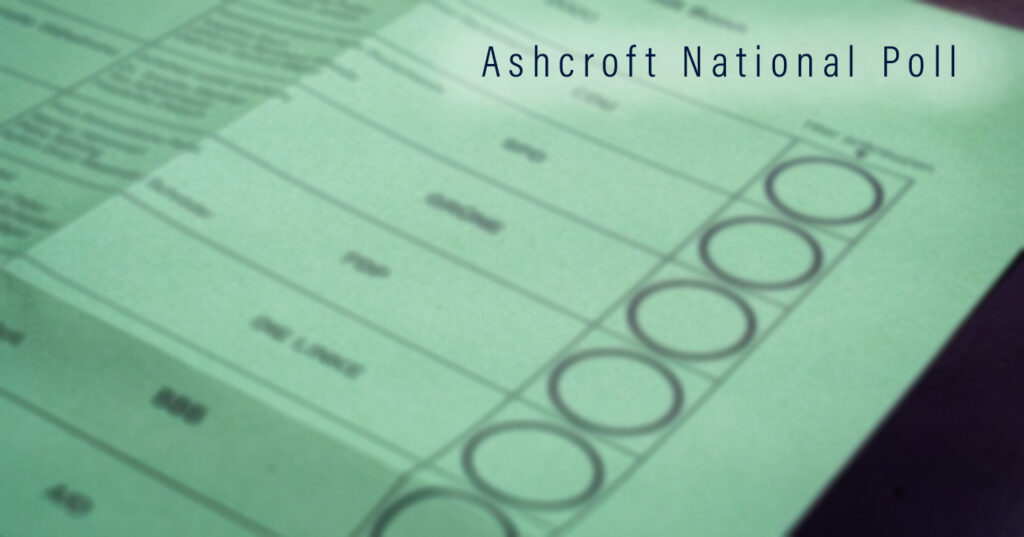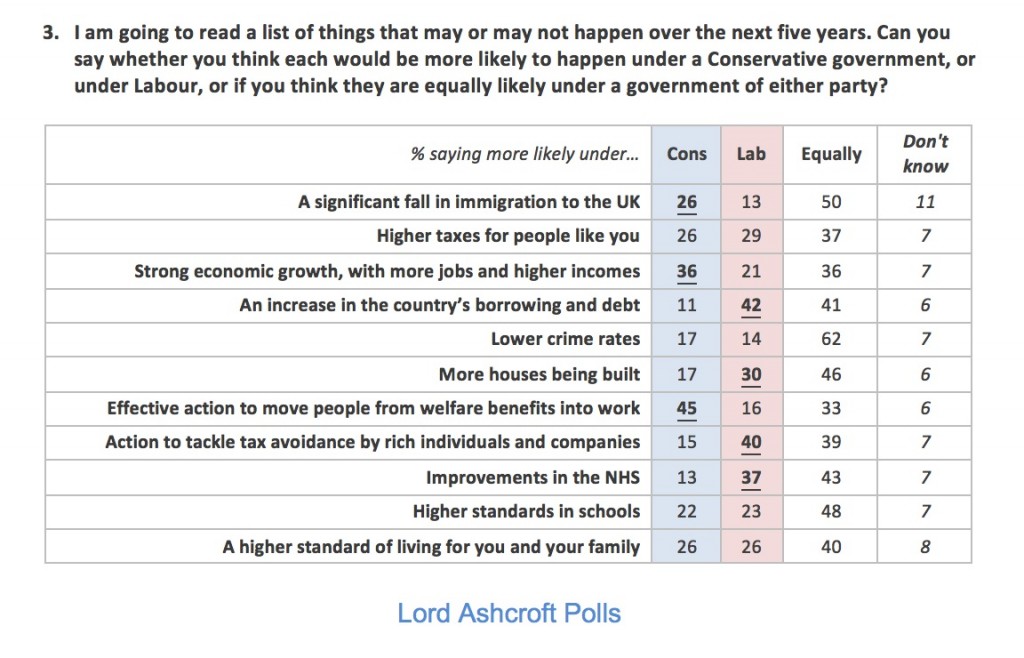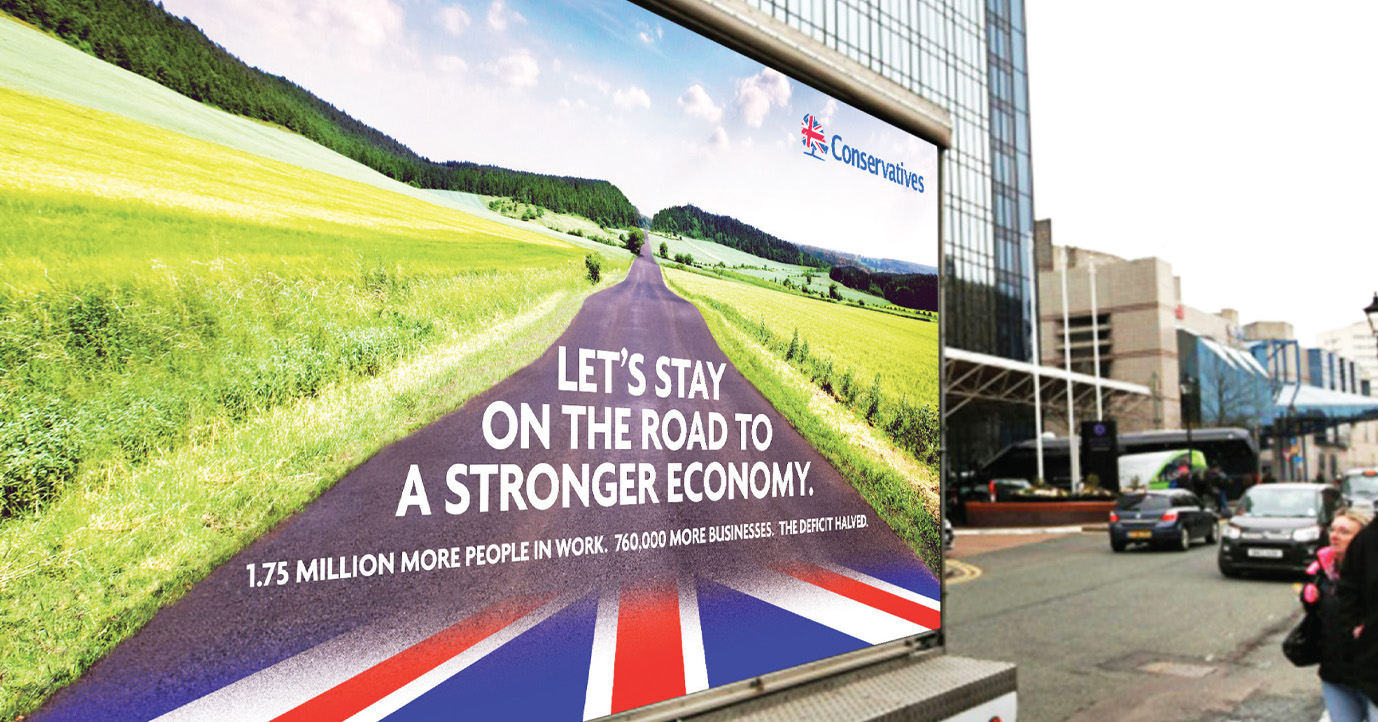
The Conservatives are back in the lead in this week’s Ashcroft National Poll. After last week’s Labour figure matched the highest share recorded in the ANP, the party has fallen back to its longer term average of 31%, with the Tories up two points to 34%. UKIP are up three to 14%, the Lib Dems unchanged at 7% the Greens down one at 7%, and the SNP static at 4%.
I asked whether people thought certain things – desirable or otherwise – were more likely to happen under the Conservatives or Labour. The Tories were thought more likely than Labour to bring about “a significant fall in immigration to the UK”, but not very likely at that: only 26% named the Conservatives, with more than six in ten saying that such an event was equally likely – or unlikely – under either party, or that they didn’t know. Only 38% of Conservative voters and 25% of Labour supporters thought immigration was more likely to fall significantly under their own party.
“Strong economic growth, with more jobs and higher incomes” was also thought more likely under the Conservatives than Labour (36% v. 21%) – indeed only just over half (54%) of Labour voters thought strong growth was more likely under a Labour government, compared to 80% of Tories who thought it was more likely under the Conservatives. A Tory government was also considered more likely to take “effective action to move people from welfare benefits into work” (45% v. 16%).
A Labour government was considered more likely than a Tory one to bring about “action to tackle tax avoidance by rich individuals and companies” (40% v. 15%), “improvements in the NHS” (37% v. 13%) and to result in “more houses being built” (30% v. 17%) – but also “an increase in the country’s borrowing and debt” (42% – including nearly three in ten Labour voters, v. 11%).
**********
This week’s focus groups with undecided voters were held in the Conservative-Labour marginal of Worcester and in Muswell Hill, part of the Hornsey & Wood Green constituency in which Lynne Featherstone finds herself in the Liberal Democrat front line against Labour. She has a fight on her hands, as my polling in the seat has found (and not even the Lib Dems’ mysterious private polling claims to contradict) but on this evidence, if she does lose she should not take it personally.
“I’m on Lynne’s mailing list and get her emails” said one participant (everyone called her Lynne – a mark of familiarity generally reserved only for Boris); “she’s on the ball and connected to the local area”. “I emailed her about a petition,” said another. “She replied and explained why we couldn’t do the thing we were asking for, and I thought, fair play, I’ve heard the other side”. Nearly everyone had received regular letters or literature and an unusual number had had personal contact during her time as the MP: “Lynne has spent time talking to me and come to my door and answered emails”. Some had noticed her actions as a Minister: “She was in the press for stopping some misogynistic bloke coming to the country because he did a video on how to pick up women. I like that. She’s proactive and just does it.”
But rather more in sorrow than in anger, most of those who had voted Lib Dem at the last election planned to switch in May. The party had seemed a positive alternative in 2010 (“they cared about the little people, the ants on the ground”), but had disappointed them either by going into coalition in the first place (“I felt duped!”) or because they did not seem to have asserted themselves (“I understood why he would join the coalition to try and push through his policies but he has taken a back seat. I thought he would have more influence over Cameron”; “They used to have gumption but it seems to have dispersed.”) The priority for these left-leaning voters, then was to change the government: “I was upset about the war and other things, so I voted Lib Dem. But now I’m going to be more strategic. I want the Tories out.”)
**********
Some of those who were unconvinced by Labour were considering the Greens, and the groups had noticed the party’s leader “making a shambles” in her LBC radio interview – although, perhaps mercifully, nobody could remember her name (“Bennett I think. Is it Jane? No hang on, I’m thinking of Pride & Prejudice”). The few who had heard the infamous interview agreed it was excruciating (“it was like a sketch from The Fast Show”) but for those who had not already dismissed the Green Party, the episode had not dented its appeal: “In some ways it endears me to them a bit more. There is so much pressure and some of them are so slick, and they have their spin doctors. People get flustered, it’s human”; “At least it wasn’t the usual double-speak. Politicians don’t usually answer the question anyway.”
**********
For our groups, the Straw-Rifkind debacle had joined HSBC and tax avoidance on the list of not particularly staggering stories that were peripheral to the main campaign. Among those who had realised the incident had been a media sting and no money had changed hands (which was by no means everybody: “they’ve been paid to lobby for the Chinese” was a frequent synopsis), some were surprised that characters of such experience should have fallen for the ruse – which suggested that most of their junior colleagues would have been only too willing to go along with the scheme. Our participants had noticed that the parties had acted quickly to suspend both MPs, but “they had to, to get it off the news.”
**********
Our groups had also clocked David Cameron’s pledge to retain the Winter Fuel Allowance, free bus passes and TV licences for pensioners. As always, for everyone who argued “they’ve paid their taxes, let them enjoy it,” another asked “if you’ve got your Jag parked outside, why do you need a Freedom Pass?” The Tories have evidently concluded that the argument is not going to be won on its merits either way and decided to harvest the pensioner votes (which at least everyone could agree was the main reason behind the policy).
**********
Pressed to name one good thing the government had done in the last five years, the groups (after some considerable thought) came up with a longer list than you might have expected. Raising the tax allowance, free school meals, apprenticeships, Help to Buy, nursery places for two year-olds, falling unemployment, tackling the deficit, helping the economy out of recession, the welfare cap, low interest rates, cutting Stamp Duty and “managing to hold onto Scotland” all made the list. The “Bedroom Tax” was also put on the good things list as often as it was on the bad things list – which also included cutting the Armed Forces, failing to reduce immigration, “shafting teachers”, privatising the Post Office, not dealing properly with the excesses of the financial sector, “blaming people on benefits for the problems of the country” and the amorphous hobgoblin of NHS “privatisation”.
The question of what would change under the Labour government that could take over in ten weeks produced even more head scratching. Some more apprenticeships, a Mansion Tax (which one woman, a social worker, said “would give the impression that if you work hard and succeed you will be punished for it”), a higher minimum wage, possibly more house building, and “they might invest more in the NHS to keep it going”. Promises that had got through from any party were hard to believe: “I only believe what they say about what they’re going to cut.” For some, the main thing that would change under Labour would be “the face we see on TV”.
**********
Partly to counter the idea that nothing would change under a new government, Labour recently produced a short video featuring “101 reasons to vote Labour”. The format, with cheery people holding up a succession of placards bearing handwritten Labour pledges, felt “bright, positive, optimistic”, as did the musical accompaniment and absence of commentary: “we get enough of politicians talking”. But some people – by no means all unsympathetic to Labour – suspected that the “bamboozling” rush of policies projected at a speed to quick to read did not suggest an abundance of good ideas but a dearth: “it’s as though they don’t want you to read them, just in case.”
A Conservative video, apparently modelled on a film made for the Australian Liberals, shows a succession of Tory achievements falling and then crashing into the background against a vintage recording of Wish Me Luck As You Wave Me Goodbye. It closes with a picture of the Labour leader and the warning: “Ed Miliband and the economy: Don’t risk it”. Most people protested about negativity and personalisation and wished the party would say “this is what we’ve done, this is what we face, this is our future plan”. But one or two of the men admitted they found it “quite powerful. The trouble is, he hasn’t got the face.”
**********
That is all very well, you say, but what if the leaders were holiday destinations? Well, I am glad you asked. Mr Cameron, according to our groups, would be “somewhere suave, like Monaco”, or quite possibly “an offshore island to store your money in”. Mr Farage would simply be “Blighty!”, probably Margate or Southend because “they adore him down there” or (the view from Muswell Hill) “Benidorm. Somewhere tacky and loud with egg and chips”. Mr Clegg would be somewhere “nice and inoffensive”, or possibly, since he must feel beleaguered, a distant location like the Caribbean “where people don’t know him so he won’t get hassled all the time”. Mr Miliband? A place “where the traffic is terrible, because he doesn’t have any sense of direction.” Alternatively “the Moon, his own little world,” or more charitably “somewhere misunderstood – a really nice place but no-one goes there.”



